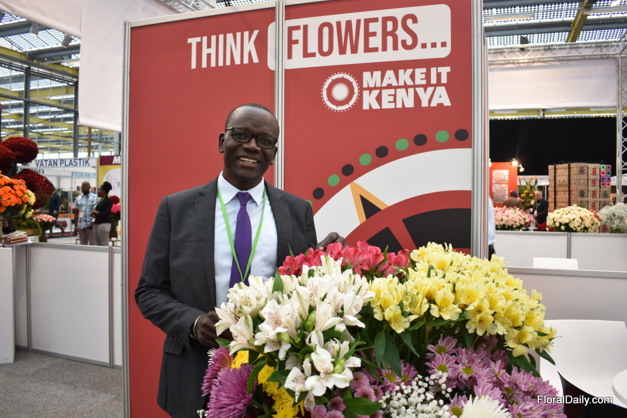The zero pest tolerance directive in Australia is effective since September 1, 2019. This announcement was giving the growers exporting to this country a hard time. Kenya Flower Council (KFC) together with the Kenya Plant and Health Inspectorate services (KEPHIS) and other private sector bodies did and are still doing their utmost best to comply with the rules. So, how are things going at the moment? We had a chat with Clement Tulezi, Chief Executive, KFC at the IFTF earlier this month, and he told us more about how they are dealing with the situation to continue exports to this country.

Clement Tulezi at the IFTF 2019 in Vijfhuizen, the Netherlands.
Import permit
Growers can export their products to Australia if their importer applied for and received an import permit to import from that grower. These permits help to reduce the biosecurity risk to Australia by requiring that additional pest management controls are in place in the exporting country. To receive the permit, the importer needs to check and report the conditions required at the farm to ensure pest free flowers. (Click here to see the steps needed to apply for a permit)
Mobile fumigation
As applying for an import permit entails quite some work for the Australian importers, the Kenyan growers and associations are searching for alternative solutions. A number of fumigation facilities, including mobile are under consideration. "In this way, we do not have to fumigate everything we export; only shipments that are being exported to Australia." Tulezi has good hopes for this solution. "We are working on it and in the future, we might have some trucks that have fumigation chambers instead of an airport facility, which will provide an easier solution to a number of exporters within a given region."
Enhancing systems approach
In order to enable the importers to apply more easily for the import permits, growers, KFC and the other associations in Kenya are working in enhancing the systems approach. "A systems approach is a series of integrated pest management measures applied at different points in the supply chain. An NPPO-approved systems approach offers an alternative to treatments such as methyl bromide fumigation", as stated on the website of the Australian Government Department of Agriculture. The conditions in this system are being checked if they are being met before applying for a permit. "At the growers' farm procedures, we are working hard to limit as much pests as possible by using preventative methods like traps, fogging, and dipping. We did some trials and it worked out well for the farms. We will continue working on enhancing it."
Kenya - Australia's main supplier
Over the years, the imports of cut flowers and foliage arriving in Australia have increased more than threefold. Kenya is one of their main suppliers - over 50 percent of their flowers come from Kenya, accounting for about 27 million USD in 2018, which is 2.36 percent of the total flower exports out of Kenya. Even though Australia isn't Kenya's largest export market (Europe is), they are eager to continue providing this market with flowers and will, therefore, keep searching for solutions to keep complying with the rules.
 Kenya Flower Council
Kenya Flower CouncilSuite 12, 4th Floor,
The Greenhouse Building,
Adams Arcade, along Ngong Road
Mobile: (254) (0)733 639 523
[email protected]
kenyaflowercouncil.org
